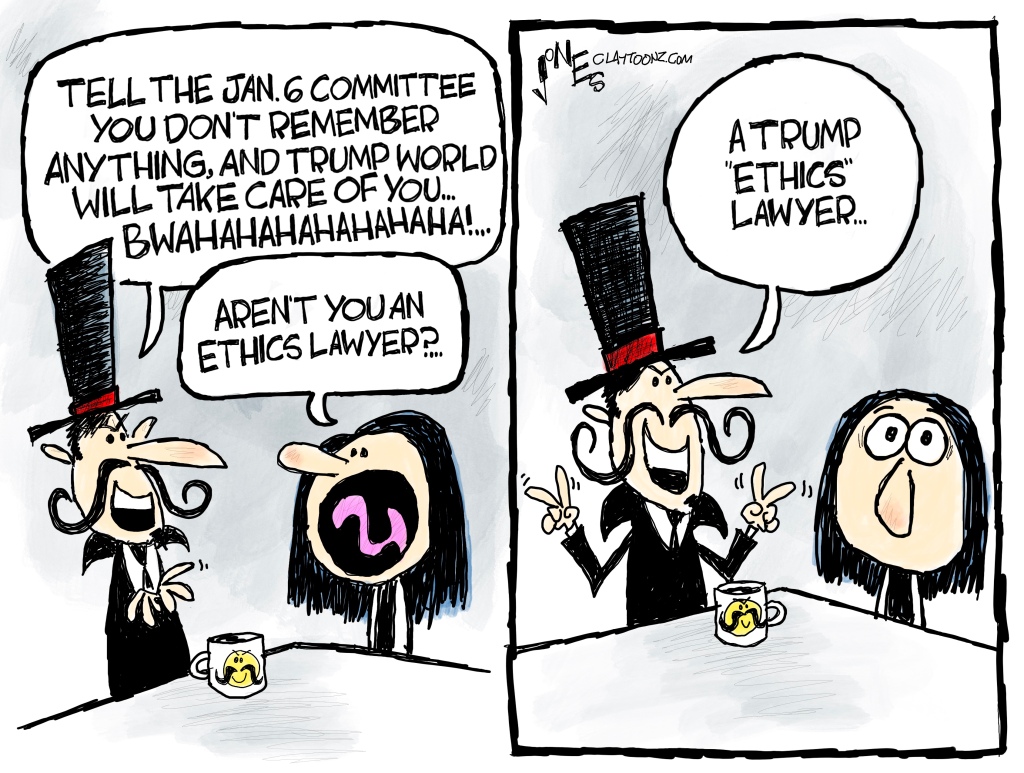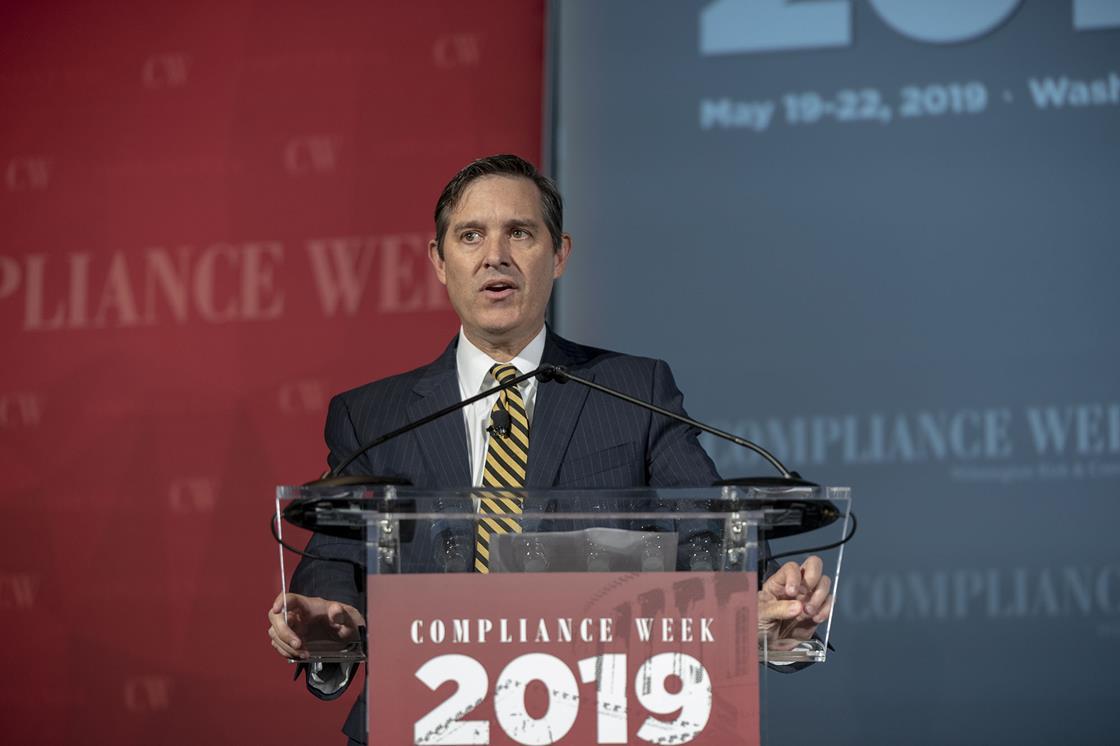A graduate of the Emory University Law School, licensed inI Georgia and Washington, D.C. Mr. STEFAN CHARLES PASSANTINO was TRUMP's White House Ethics Counsel.
Now there's an oxymoron.
Are too many American lawyers for large organizations unethical schemers?
You tell me.
Are too many of them "hired knife throwers," in the words of one of the books we read Professor Wade Hampton "Toby" Sides' Jurisprudence course at Memphis State University in 1986, Becoming a Lawyer -- A Humanistic Perspective on Legal Education (1980)(c0-sponsored by the National Institute for Mental Health)?
You tell me.
Just like the lawyers responsible for Watergate, Trumpery, Dalkon Shield fraud, Asbestos fraud, Big Tobacco fraud, Big Oil global warming, pollution, price-fixing, overdevelopment, monopoly and fraud?
Here's feculent fast-talking fraudfeasing STEFAN CHARLES PASSANTINO opining about "low and dirty" political ads in 2012:
You tell me.
Enough flummery, dupery and nincompoopery.
From Above the Law blog:
Stefan Passantino, Call Your Lawyer!
And maybe your priest.
 It’s been quite a week for Stefan Passantino, the former White House ethics lawyer who went on to represent the Trump campaign, members of the Trump family, and Cassidy Hutchinson, the former Mark Meadows aide whose blockbuster testimony rocked the January 6 Select Committee hearings this summer.
It’s been quite a week for Stefan Passantino, the former White House ethics lawyer who went on to represent the Trump campaign, members of the Trump family, and Cassidy Hutchinson, the former Mark Meadows aide whose blockbuster testimony rocked the January 6 Select Committee hearings this summer.
On Monday, at the conclusion of the final public hearing, Rep. Zoe Lofgren alluded to a witness whose lawyer tried to manipulate her testimony to help Donald Trump and his allies hide the truth about the events leading up to the Capitol Riot. Approximately five minutes later, Passantino’s bio disappeared from the website of his law firm Michael Best. Then yesterday, CNN confirmed that Lofgren was referring to him. And today the committee released Hutchinson’s transcript of a interview she gave in September describing her interactions with Passantino.
It’s… a lot. So we’re going to structure this post like a mini-MPRE issue spotter exam. Given the allegations laid out in this testimony, let’s see how many potential problems we can spot in these few excerpts. Ready?
Let’s not make this whole attorney-client thing too formal, it ruins the magic, right?
He had called and let me know that he was my attorney. And it was a really brief call. And that – in that – on that call, though, I had asked him who – well, I had asked him about signing the engagement letter, because I had said, “This would be great if we can meet in person soon.”
My document deadline date at that time was, I believe, Tuesday, February 8th. I let him know that, and I was like, “I probably should sign an engagement letter. And he said, “No, no, no. We’re not doing that. Don’t worry. We have you taken care of.”
And I said – remember asking him, “I don’t have to sign an engagement letter?” Because that was sort of the first alarm bell in my head that went off, because I wanted something in writing for myself, because I already was – I kind of sometimes have a tendency to overthink things. And I had never had to retain an attorney before. But do know enough to know that you are — you should be signing an engagement letter.
Some things are better left a mystery. Like who’s paying for representation.
So then I had asked him, “All right. Well, that’s perfectly fine. Would you mind letting me know where the funding for this is coming from? I want to thank them. want to thank whoever it is, because I’m just trying to kind of like figure things out.”
And he said, “If you want to know at the end, we’ll let you know, but we’re not telling people where funding is coming from right now. Don’t worry, we’re taking care of you. Like, you’re never going to get a bill for this, so if that’s what you’re worried about.
I was like, “Okay. That’s what I was worried about.” Wasn’t the only thing I was worried about.
The substance of your testimony, though, should be a mystery to exactly no one in Trumpland.
Hutchinson: Later that day, sort of put together that the “they” he was referring to then were Justin Clark, Alex Cannon, Eric Herschmann. I think that’s – yeah, I think that’s all of them.
Rep. Cheney: And how did you put that together?
Hutchinson: Because he – he had said that — Justin — yeah, Justin Clark.
Stefan had told me that – towards the end of the day that because he was involved with Elections, LLC, and tangentially, I guess Trump’s PACs, he had law partners. And unless I was extremely unwilling for him to share, he said it would be natural for him to have to share that information with the people that he works with that are his partners that are involved in Trump world.
Don’t print out your calendar. Or think too hard.
And he had said. “Well, we’re not building out timelines. So, unless you remember, like, a very specific day with a very specific event, like, “I don’t recall’ is your answer. So that’s when he sort of — sort of had went into the “I don’t recalls.”
And he said, “If you don’t 100 percent recall something, even if you don’t recall a date or somebody who may or may not have been in the room, that’s an entirely fine answer, and we want you to use that response as much as you deem necessary.” I said. “But, if I do recall something but not every little detail, Stefan, can I still say I don’t recall?”
And he had said, “Yes. And I said, “But if I do remember things but not every little detail, and I say I don’t recall, wouldn’t I be perjuring myself?”
And he had — Stefan had said something to the effect of, “The committee doesn’t know what you can and can’t recall, so we want to be able to use that as much as we can unless you really, really remember something very clearly. And that’s when you give a short, sweet response. The less you remember the better. I don’t think you should be filling in any calendars or anything.”
Who’s the client here?
And in that same conversation, he said, “So if you have any conversations with any of them, especially Eric Herschmann, we want to really work to protect Eric Herschmann. And I remember saying sarcastically to him, “Eric can handle himself. Eric has his own resources. Why do I have to protect Eric?” He said, “No, no, no. Like, just to keep everything straight, like, we want to protect Eric with all of this.”
No, but seriously, WHO IS THE CLIENT?
And he kept saying to me, like, “Cass, you’re a good person. I don’t want you to feel like you have to bear the weight of responsibility for all these other people. Like, the committee is talking to so many people that, even if you were entirely forthcoming with them, they’re going to have all this by the end from someone else anyway. I don’t want you to be put through the ringer on this. It’s not fair to you. It’s not fair that Mark put you in this position. We just want to focus on protecting the President. We all know you’re loyal. Let’s just get you in and out, and this day will be easy, I promise. Like, you really have nothing to worry about.”
Oh, right. The client is the one who calls the shots.
He was like, “But, if we – if we even think about engaging with them, there is no way that we can do this without a second subpoena. Trump world will not continue paying your legal bills if you don’t have that second subpoena.”
So that was the first moment in my mind where I had it sort of corroborated. Now, I had had my strong suspicions that the funding was coming from Trump world. He never gave any indication that it was, the actual financials of it was coming from Trump world, until he said it that night.
The client is the one who gets kept abreast of the details of her case and gets to decide if she wants to risk going to jail or not.
Stefan texted me Monday, June 6th, in the morning. He said, “With DOJ refusing to hold Mark and Scavino in contempt and with the committee talking about you to the press again, I don’t see why we do anything more with them. There’s a small element of risk to refusing to cooperate, but I think it’s the best move for you. Do you agree?”
I said, “Did they reach out about a live hearing? I don’t want to gamble with being held in contempt, Stefan. I’m sorry, but I just don’t think I can do it.”
It’s not a lie if it’s … circumstantial?
He was like, “Did you overhear things?”
And I said, “Yes.
And he said, “Were you in the meetings?”
I said. “Not all of them, but I was in some of them.”
He was like, “Well, if you had just overheard conversations that happened, you don’t need to testify to that.”
“So, if I overheard it from a Member, do I have to?”
And he said, “It’s circumstantial. We can talk about it.” So I said, “Okay.”
It’s not a lie if … they can’t prove it?
I looked at Stefan, and I said, “Stefan, I am fucked.”
And he was like, “Don’t freak out. You’re fine.”
I said. “No, Stefan, I’m fucked. I just lied.”
And he said, “You didn’t lie.
I said, “No, Stefan. Do you know how many times they just asked me that
question? I just lied.”And he said, “They don’t know what you know, Cassidy. They don’t know that you can recall some of these things. So you saying ‘I don’t recall’ is an entirely acceptable response to this.”
He’s like, “They’re prodding. They want there to be something. They don’t
know that there is something. We’re not going to give them anything because this is not important. You’re doing great. You’re doing fine.
You’re doing exactly what you should be doing.”
Okay, pencils down.
WOW.
Elizabeth Dye lives in Baltimore where she writes about law and politics.



1 comment:
Frivolous litigation is the new norm for Republicans. Find some otherwise well to do and accomplished person, throw them at a fictitious problem, and burn the both of you to the ground for nothing. If you don't end up in jail then "you haven't fought hard enough." Many of them are de-evolving back into apes. This is the final verdict.
Post a Comment